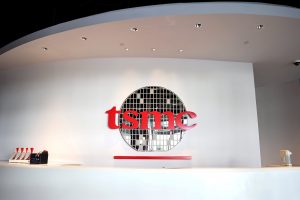Taiwan’s TSMC has told its major suppliers to delay the delivery of high-end chipmaking equipment, sending out a worrying signal about slumping global demand for tech products.
The world’s top contract chipmaker is growing increasingly nervous about customer demand, sources said, with mobile phone, laptop, industrial and more recently automotive chips seen as problem areas.
The instruction by TSMC, which is grappling with delays at its $40 billion chip factory in Arizona, is aimed at controlling costs and reflects the company’s growing caution about the outlook for demand, the sources added.
Also on AF: China Must Change Course, For Its Own Sake And World’s: IMF
Suppliers currently expect the delay to be short-term, the sources said, declining to be named as the information is not public. TSMC said it does not comment on what it called “market rumour”.
The company referred Reuters to comments by CEO CC Wei in July that weaker economic conditions, a slower recovery in China and softer end-market demand is making customers more cautious and more mindful of controlling inventory.
Companies affected by the instruction to delay include ASML, which makes lithography equipment essential for high-end chipmaking, one of the sources said.
In an interview with Reuters last week, ASML CEO Peter Wennink said some orders for its high-end tools have been pushed back, without saying who by, and that he expected it would be a “short-term management” issue.
ASML, Europe’s most valuable tech listed company, is operating at maximum capacity and overall sales are forecast to grow 30% this year.
“We’ve had several reports about fab readiness. Not only in Arizona … but also in Taiwan,” Wennink told Reuters, referring to preparations for chip manufacturing.
Shares in ASML declined 2.5%, making the company the biggest loser in the euro zone STOXXE50 index.
ASM International, a smaller equipment firm that is also a supplier to TSMC, fell 5.6%, with BE Semiconductor, a packaging equipment firm, down 3.3%.
Major US semiconductor firms Applied Materials, KLA Corp and Lam Research were all down between 2.2% and 2.6% in premarket trading.
Tech Share Sell-Off
Analyst Michael Roeg of Degroof Petercam said he was not surprised by the selloff.
“There has been a lot of excitement about artificial intelligence and the implications for the semiconductor industry,” he said, adding that AI was positive for TSMC, which makes chips for Nvidia.
“However the strength in demand for AI chips is not strong enough to compensate [for] what is happening in other segments.”
He cited mobile phone, laptop, industrial and more recently automotive chips as problem areas. “That’s a lot of end markets that are sluggish,” he said.
TSMC has been forced to push back production at the Arizona plant by a year to 2025, as it struggled to recruit workers and faced pushback from unions on efforts to bring in workers from Taiwan.
“If you ship a lot of people from Taiwan to help build a factory in Arizona, they’re not working somewhere else. So this is kind of a double whammy,” Wennink said.
TSMC Chairman Mark Liu said last week there had been “tremendous” improvement at the Arizona site in the last five months.
The Taiwanese chip giant is not alone in worrying a bounceback in demand may take longer than expected.
China iPhone Ban Impact
Apple, a key TSMC customer, launched a new series of iPhones this week that included a faster chip, but it did not raise prices, reflecting the global smartphone slump.
Media reports that Beijing has ordered some government employees to stop using iPhones at work, and the launch by tech firm Huawei of a flagship phone using Chinese-made chips, is causing further unease at TSMC, one of the sources said.
TSMC used to make chips for Huawei but suspended supplies after Washington imposed sanctions on the Chinese firm. Analysts have found Huawei worked with Chinese contract chipmaker Semiconductor Manufacturing International Corp (SMIC) to manufacture an advanced chip for its latest smartphone.
TSMC forecast in July a 10% slide in 2023 sales and as much as a 4% point drop in operating margin this quarter from the previous quarter, citing weak demand for smartphones and PCs and uncertainty about the market for artificial intelligence.
The chipmaker is also facing elevated capital expenditure, which increased 21% to $36 billion last year, from expansion plans put in place during the pandemic-driven chips boom.
It estimated in July that investment spending for this year would be at the lower end of a previous forecast of $32 billion to $36 billion, and said it expected a slower increase in the next few years.
- Reuters with additional editing by Sean O’Meara
Read more:
‘Frustrated’ in US, TSMC Finds Japan Chipmaking a ‘Natural Fit’
Arizona Workers Say Building TSMC Factory ‘Worst Job Ever’ – BI
Taiwan Chip Giant TSMC to Pump $3.8bn Into New German Fab
Chip Giant TSMC Flags 10% Sales Dip on Weak Global Demand























